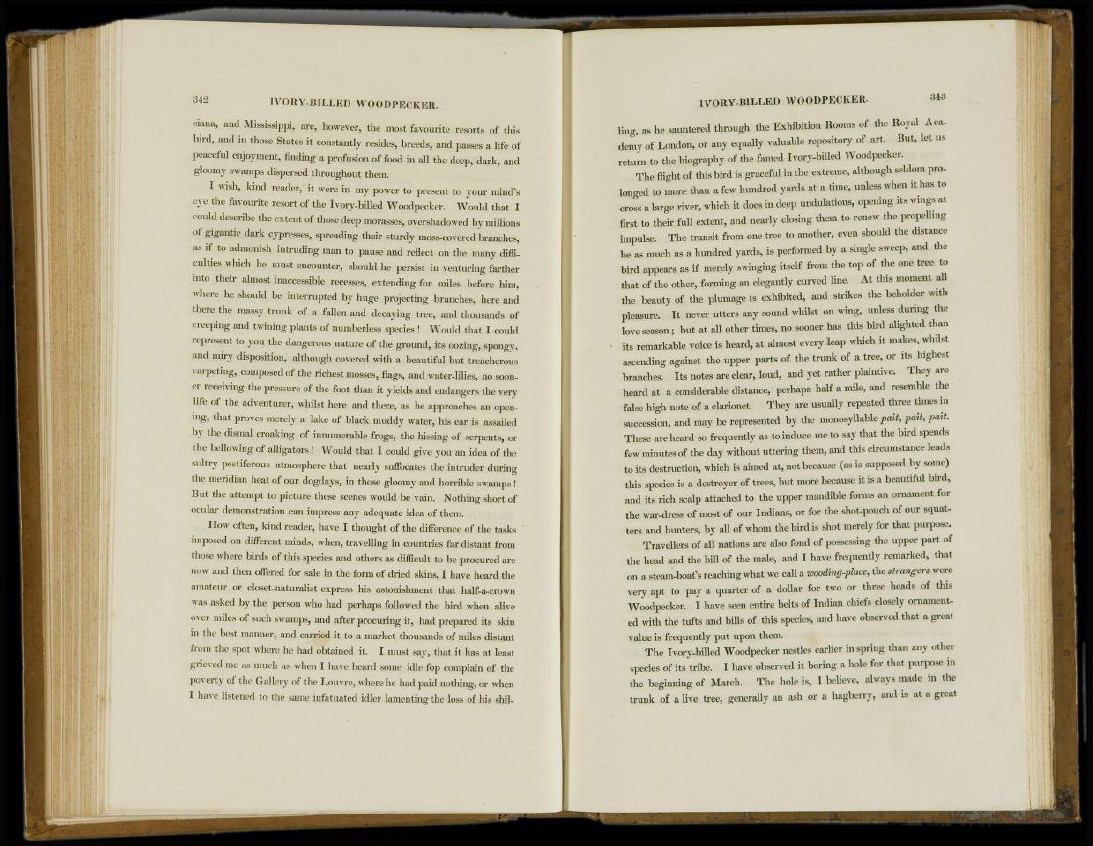
siana, and Mississippi, are, however, the most favourite resorts of this
bird, and in those States it constantly resides, breeds, and passes a life of
peaceful enjoyment, finding a profusion of food in all the deep, dark, and
gloomy swamps dispersed throughout them.
I wish, kind reader, it were in my power to present to your mind's
eye the favourite resort of the Ivory-billed Woodpecker. Would that I
could describe the extent of those deep morasses, overshadowed by millions
of gigantic dark cypresses, spreading their sturdy moss-covered branches,
as if to admonish intruding man to pause and reflect on the many difficulties
which he must encounter, should he persist in venturing farther
into their almost inaccessible recesses, extending for miles before him,
where he should be interrupted by huge projecting branches, here and
there the massy trunk of a fallen and decaying tree, and thousands of
creeping and twining plants of numberless species ! Would that I could
represent to you the dangerous nature of the ground, its oozing, spongy,
and miry disposition, although covered with a beautiful but treacherous
carpeting, composed of the richest mosses, flags, and water-lilies, no sooner
receiving the pressure of the foot than it yields and endangers the very
life of the adventurer, whilst here and there, as he approaches an opening,
that proves merely a lake of black muddy water, his ear is assailed
by the dismal croaking of innumerable frogs, the hissing of serpents, or
the bellowing of alligators! Would that I could give you an idea of the
sultry pestiferous atmosphere that nearly suffocates the intruder during
the meridian heat of our dogdays, in those gloomy and horrible swamps !
But the attempt to picture these scenes would be vain. Nothing short of
ocular demonstration can impress any adequate idea of them.
How often, kind reader, have I thought of the difference of the tasks
imposed on different minds, when, travelling in countries far distant from
those where birds of this species and others as difficult to be procured are
now and then offered for sale in the form of dried skins, I have heard the
amateur or closet-naturalist express his astonishment that half-a-crown
was asked by the person who had perhaps followed the bird when alive
over miles of such swamps, and after procuring it, had prepared its skin
in the best manner, and carried it to a market thousands of miles distant
from the spot where he had obtained it. I must say, that it has at least
grieved me as much as when I have heard some idle fop complain of the
poverty of the Gallery of the Louvre, where he had paid nothing, or when
I have listened to the same infatuated idler lamenting the loss of his shilling,
as he sauntered through the Exhibition Rooms of the Royal Academy
of London, or any equally valuable repository of art. But, let us
return to the biography of the famed Ivory-billed Woodpecker.
The flight of this bird is graceful in the extreme, although seldom prolonged
to more than a few hundred yards at a time, unless when it has to
cross a large river, which it does in deep undulations, opening its wings at
first to their full extent, and nearly closing them to renew the propelling
impulse. The transit from one tree to another, even shoidd the distance
be as much as a hundred yards, is performed by a single sweep, and the
bird appears as if merely swinging itself from the top of the one tree to
that of the other, forming an elegantly curved line. At this moment all
the beauty of the plumage is exhibited, and strikes the beholder with
pleasure. It never utters any sound whilst on wing, unless during the
love season; but at all other times, no sooner has this bird alighted than
its remarkable voice is heard, at almost every leap which it makes, whilst
ascending against the upper parts of the trunk of a tree, or its highest
branches. Its notes are clear, loud, and yet rather plaintive. They are
heard at a considerable distance, perhaps half a mile, and resemble the
false high note of a clarionet. They are usually repeated three times in
succession, and may be represented by the monosyllable pait, pait, pait.
These are heard so frequently as to induce me to say that the bird spends
few minutes of the day without uttering them, and this circumstance leads
to its destruction, which is aimed at, not because (as is supposed by some)
this species is a destroyer of trees, but more because it is a beautiful bird,
and its rich scalp attached to the upper mandible forms an ornament for
the war-dress of most of our Indians, or for the shot-pouch of our squatters
and hunters, by all of whom the bird is shot merely for that purpose.
Travellers of all nations are also fond of possessing the upper part of
the head and the bill of the male, and I have frequently remarked, that
on a steam-boat's reaching what we call a zvooding-place, the strangers were
very apt to pay a quarter of a dollar for two or three heads of this
Woodpecker. I have seen entire belts of Indian chiefs closely ornamented
with the tufts and bills of this species, and have observed that a great
value is frequently put upon them.
The Ivory-billed Woodpecker nestles earlier in spring than any other
species of its tribe. I have observed it boring a hole for that purpose in
the beginning of March. The hole is, I believe, always made in the
trunk of a live tree, generally an ash or a hagberry, and is at a great